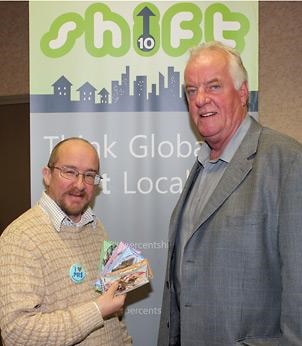Spending more locally contributes to a stronger and more sustainable economy. That’s the message heard by people who attended the Powell River Chamber of Commerce luncheon on Thursday, October 25.
Barry O’Neill, president of CUPE (Canadian Union of Public Employees) BC and vice-president of CUPE Canada, gave a presentation about the Ten Percent Shift campaign, which encourages people to pour 10 per cent of their existing consumer spending into local business, local products or local materials.
The CUPE campaign is about what residents can do differently, O’Neill said. “This presentation is not about stopping anything,” he said. “It’s about starting something different and I think we have the ability to do that.”
O’Neill’s presentation included a picture of a bucked filled with dollars, but with holes that leaked some of that money. “The band-aids are really something that we can provide in slowing down the speed in which the money leaves the community, so it gets more value, so we can use it more effectively, so it benefits the community in which we live,” he said. “That’s called the economic multiplier.”
O’Neill used an example of spending $100 on books. If that amount is spent at amazon.ca, no money flows into the community. If it is spent at a Chapters outlet, $13 stays in the community. If it is spent at a locally-owned bookstore, $45 stays in the community. “A shift of 10 per cent has an impact,” he said.
However, there has to be a quid pro quo for residents to support local businesses, O’Neill also said. “It may cost a little more, but evidence indicates that is not an issue.” Business has to add value, O’Neill added, by excellent customer service or offering deals from other businesses.
Other jurisdictions in North America recognize the value in supporting local businesses, O’Neill pointed out. In the United States, 23 counties and 21 of the largest cities give local businesses between five and 15 per cent uplift on procurement or local bidding processes. “They’re getting it, they’re doing it and people are thinking in our own communities that we can’t because that’s against the Competition Act, or the free trade agreement,” he said. “Take a chance. If you go to prison, I will come and visit you tons.”
That’s not going to happen, O’Neill said. “As Canadians, as British Columbians, we think that’s the case, and we need to rethink our strategy in that regard,” he said. “That’s really where the shift comes in.”
O’Neill provided some analysis from Langford, just outside of Victoria, which has a population of around 18,000 and a median income of $31,000. If every resident did the 10 per cent shift in Langford, the potential impact is $55.6 million. “If it’s not quite $55 million in your community, let’s just say it’s only $12 million, what’s wrong with that?” he asked. “The whole idea, I think, is that people are looking for a way to be able to afford where to live. Nobody that I know, including the 85,000 members I represent here in British Columbia and the over 600,000 people I represent in this country, likes to pay more tax. We have to develop different and new revenue streams that can work for us and this is how you do it, I think.”
The shift is simple, O’Neill said, with 10 per cent of all household expenditures going to buy locally to support locally owned, independent businesses. “A dollar on every $10, or $10 on every $100,” he said. “If enough of us shift, we can make a difference.”
CUPE is asking owners of small businesses to fill in an online survey to provide data for a further analysis. The union will choose four communities in BC that will be used as models for the idea. “We’re hoping that Powell River will be one of the communities,” O’Neill said. “What we have to do is have data.”
The survey, along with more information about the campaign, is available online.



